MENU
(Oct. 8, 2015 - stories by Rachel Kunker, Reach Beyond summer intern) Six summer interns serving with Reach Beyond in Ecuador came with willing hearts, ready to learn about missions but not entirely sure what that teaching would entail. As the internship began, they started to understand how little they knew, ready to make the most of their experiences.
“When I first entered Ecuador, I had no practice in the medical field,” said Connor Johnson, a medical intern from the University of Northwestern-St. Paul. “I simply had no experience with what it looked like to apply what I had been learning by ministering to people who need medical attention, especially in a Third World country.”
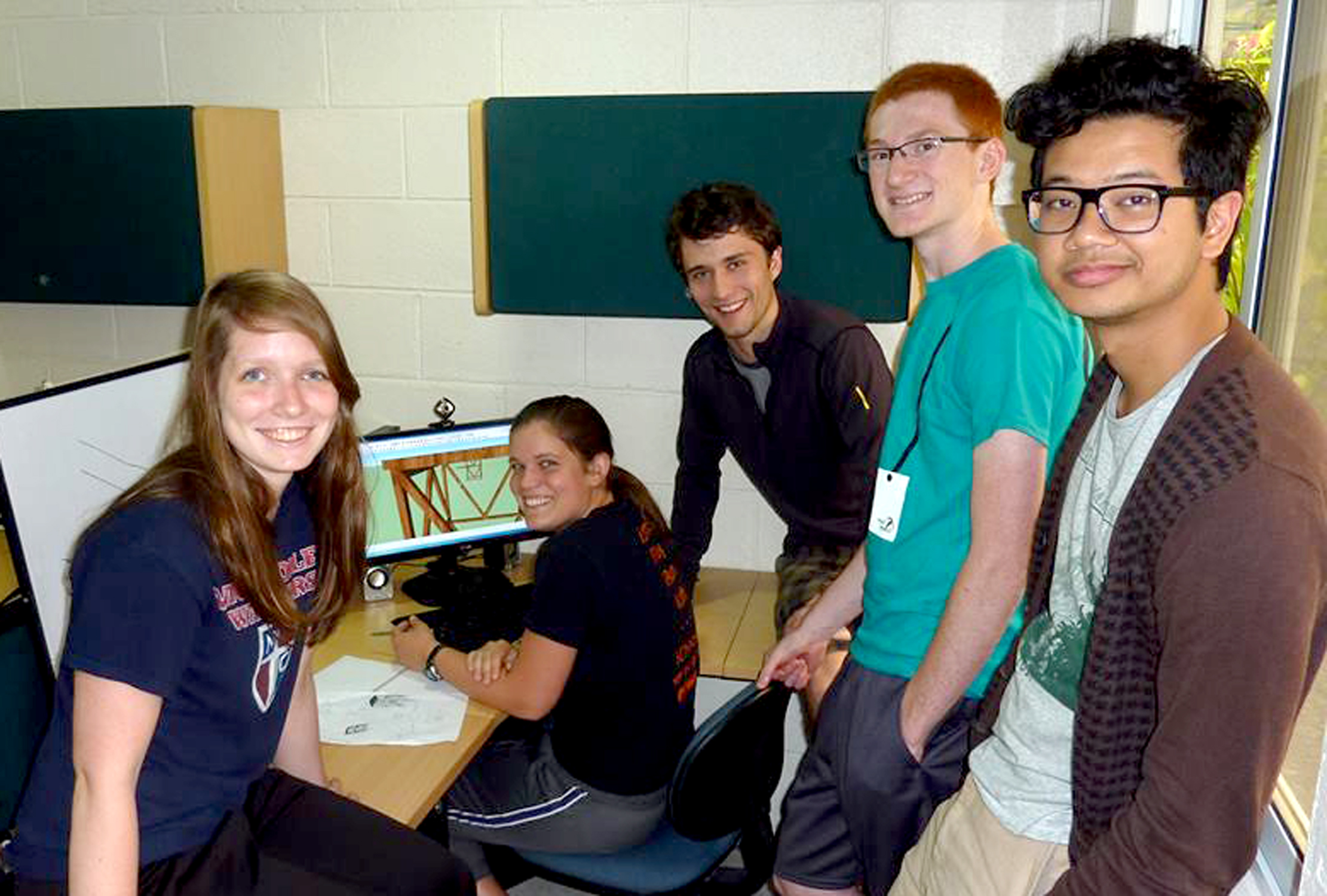 “I came into this internship not knowing anything about how engineering looks on the mission field,” added intern Tim Wolfe, a student studying mechanical engineering at Grove City College.
“I came into this internship not knowing anything about how engineering looks on the mission field,” added intern Tim Wolfe, a student studying mechanical engineering at Grove City College.
As the internship progressed, interns stepped out of their comfort zones to do unfamiliar things, including learning how to weld, constructing a 20-foot-high water tower and integrating into the Ecuadorian culture. Countless opportunities arose and the interns seized them.
“I learned to respect the roles in the jungle for men and women and to recognize when to hop in and work and when to hold back,” said Jacque Zook, an engineering intern from Virginia Tech.
“I definitely saw many variations of Ecuadorian culture and subcultures within Ecuador. It was nice to work in the busy city of Quito, in a rural clinic and with the indigenous people,” stated Johnson who was presented with the opportunities to shadow doctors, and teach hygiene in the Ecuadorian jungle.
The numerous learning opportunities and experiences enabled the interns to learn about themselves and the missionary lifestyle. They also learned that serving God is not always glamorous.
“Missionary life is not what I thought it was,” commented Johnson. “It’s not just standing on the corner and preaching to everyone—it’s incorporating Christ into your work, your relationships and every aspect of your life.”
“I was able to read books like When Helping Hurts and experience how you can meet people’s physical needs and share the gospel at the same time,” added intern *John, studying civil engineering at Wheaton College.
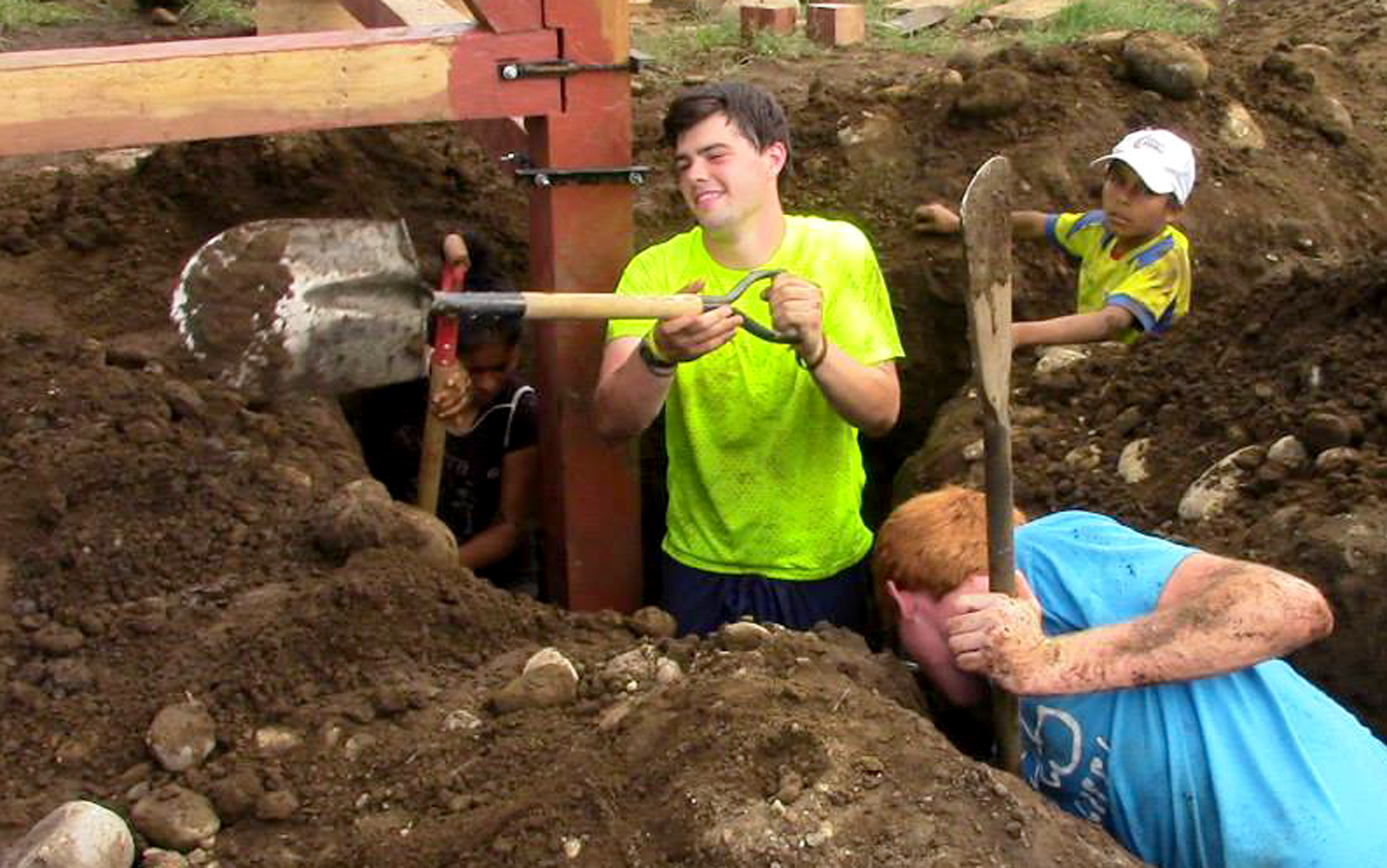 Some of the interns said they also learned more about themselves while serving in the remote jungle community of Santa Rosa where they visited four different times and built relationships. Projects ranged from helping construct a water tower to digging trenches and simply spending time with community members.
Some of the interns said they also learned more about themselves while serving in the remote jungle community of Santa Rosa where they visited four different times and built relationships. Projects ranged from helping construct a water tower to digging trenches and simply spending time with community members.
“I had a chance to travel with Gladys, one of the Shuar women, to a local farm and talk a little about Christianity with her,” commented Zook.
Serving multiple times in one community enabled interns to see community development firsthand and to understand how to be the “hands of Christ.” In addition to working to bring clean water, the interns also had opportunities to share their faith through giving their testimonies, teaching parables and praying within the community.
“This internship with Reach Beyond has shown me how I can interact and immerse myself in community and culture in a meaningful way while also being able to do engineering mission work for the glory of God,” said intern Jerome Navarro, a civil and environmental engineering student at Calvin College.
“I’ve begun to learn how to do missions with a specific skill set,” added John.
The interns learned that serving is not about what you know, but what you are willing to do, even when you do not know. The internship provided opportunities that have shaped interns into servants and has created lessons they cannot easily forget.
Rachel Kunker, majoring in intercultural studies at Nyack College in New York, was one of six students in Reach Beyond’s Ecuador summer internship this year. This involved helping with community development activities at different locations for 10 weeks.
Bridging Cultural Differences, Building Community with Water System Installation
The chainsaw roared from around 6 a.m., echoing through the nearby jungle around Santa Rosa, Ecuador, where people were getting wood ready to construct a water tower.
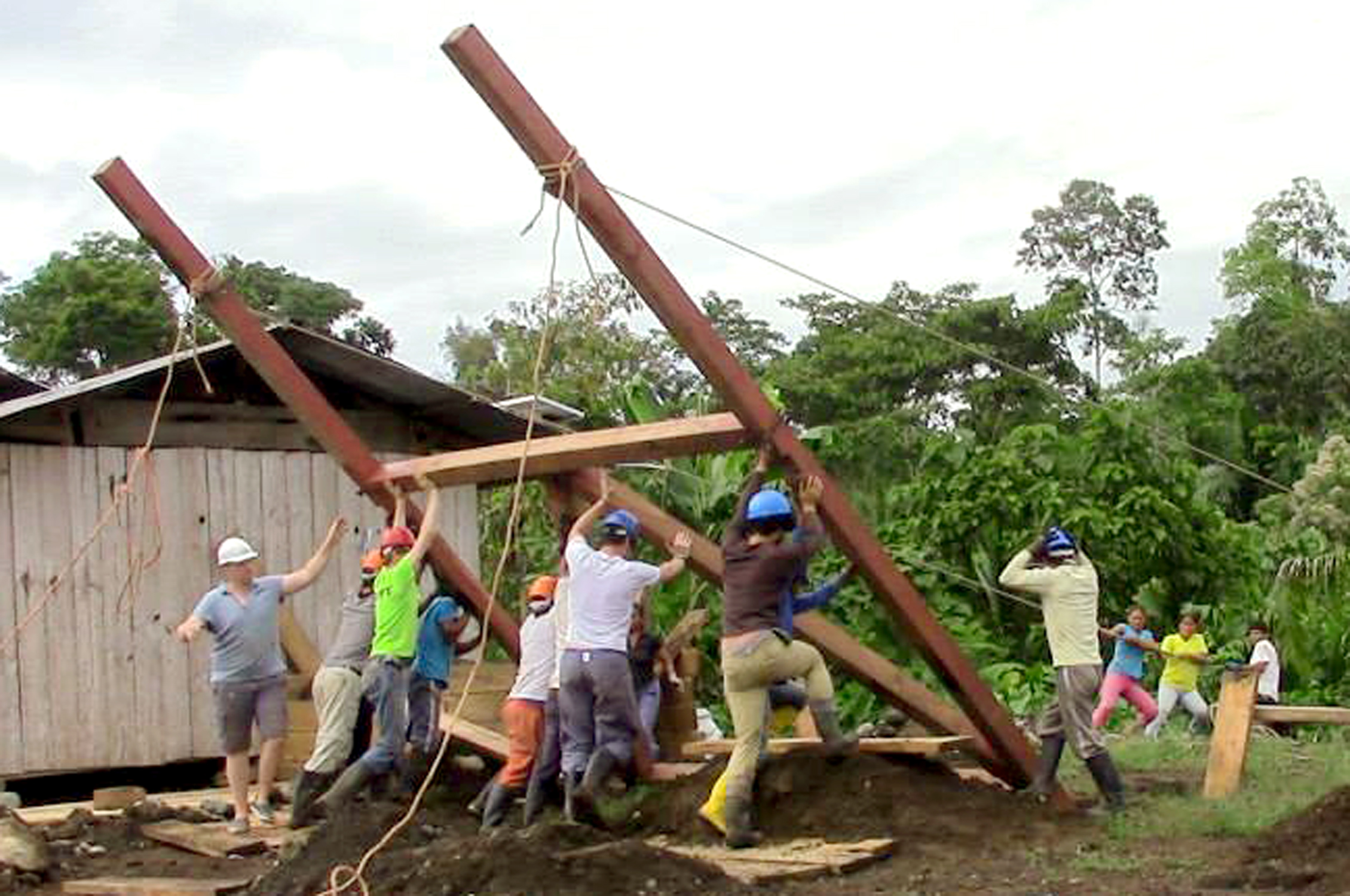 This was just one of the many steps in bringing clean water to the settlement. Excitement pulsed as the people learned and enacted what it means to take ownership of their water project. Hands were ready and hearts were open.
This was just one of the many steps in bringing clean water to the settlement. Excitement pulsed as the people learned and enacted what it means to take ownership of their water project. Hands were ready and hearts were open.
Approximately eight months earlier, Santa Rosa, a small community a half hour’s flight from Shell, received government approval to have a water system. Reach Beyond missionaries and summer interns have worked alongside the people in the system’s installation.
For the summer interns, the first trip to Santa Rosa was “just to give us interns a feel for the community and a picture of what we’d be working with,” according to intern Jacque Zook, majoring in environmental engineering at Virginia Tech. Although this was just an overnight visit, enthusiasm among the local residents was evident. All of the requested trenches had already been dug—no small task.
Through careful observation, Reach Beyond’s Wim de Groen was able to notice positive aspects of community development: respect was earned by leaders and it was given to them. Additionally, people showed attitudes of stepping up to take ownership of the project.
“They are always initiating for the next step and come up with new ideas for the system to work better in the future,” stated an intern named John, a civil engineering student at Wheaton College. By the second trip, it was clear that the people of Santa Rosa were taking complete ownership of their project.
When pipes were brought, people almost instantaneously placed them into the corresponding trenches. “The people in Santa Rosa really want their system,” said Martijn Bredius of Reach Beyond. “As water project leaders, we don’t have to drive the project. We are following them. They have a desire and are working hard to reach the end result.”
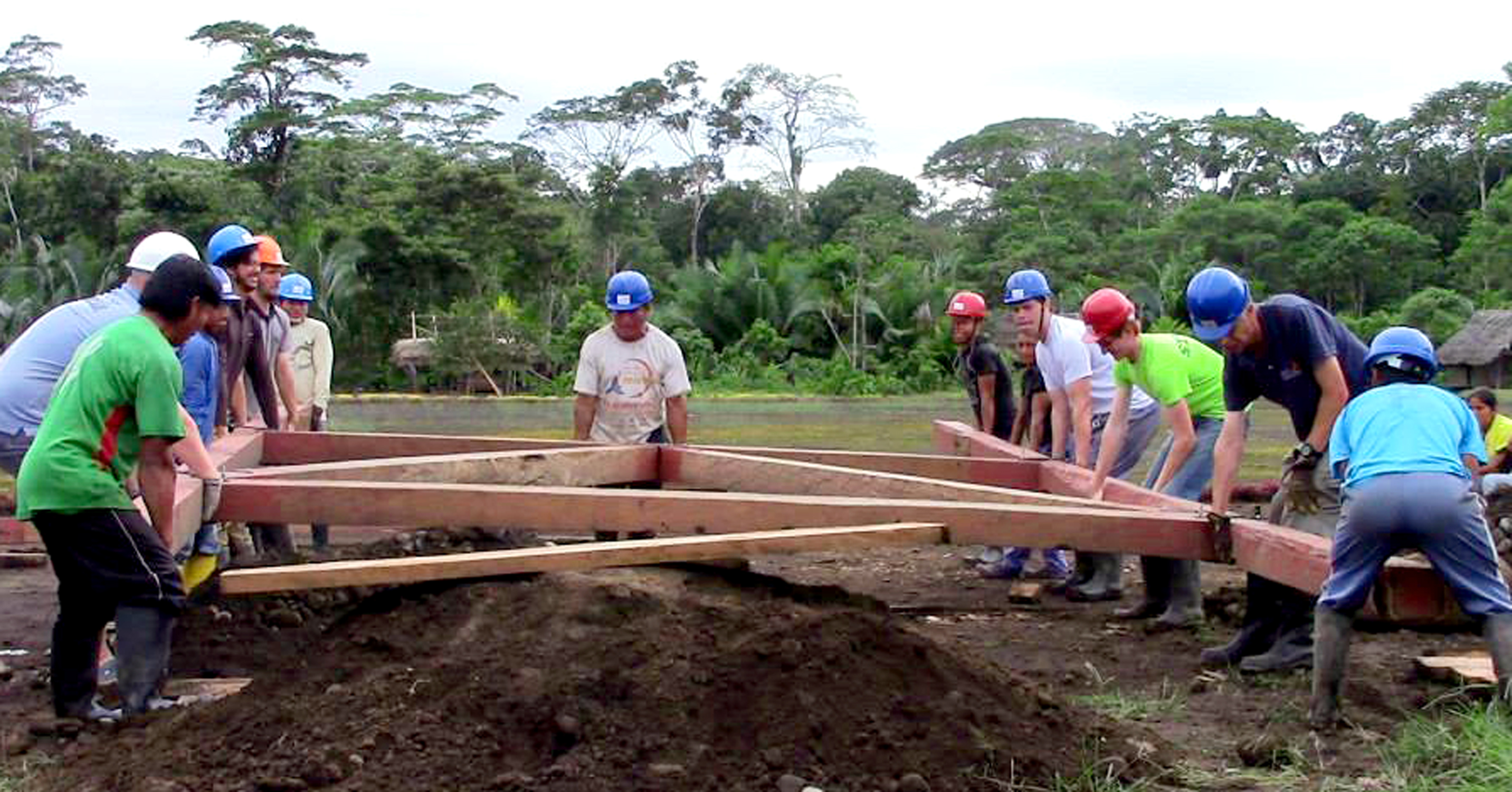 Team leader Wim de Groen reminded the interns to focus not only on the water system, but on community development in an effort to spread the gospel by forming relationships. By the third trip to Santa Rosa, those deepening relationships were clearly evident.
Team leader Wim de Groen reminded the interns to focus not only on the water system, but on community development in an effort to spread the gospel by forming relationships. By the third trip to Santa Rosa, those deepening relationships were clearly evident.
“I talked with Marco, one of the community members who has been a Christian for two years and is rapidly growing in his faith,” said Zook. “He shared his testimony with me, and then I later explained one of my favorite stories in the Old Testament to him.” The interns also learned Shuar dances, went fishing with community members, shared a drink known as chicha and played fútbol (soccer) among countless other activities.
“It’s amazing to see how much more there is to learn about other cultures and the exchanges that we have and what that reveals in our own lives and what we hold as truly important,” remarked intern Jerome Navarro, a civil and environmental engineering student at Calvin College.
In addition to constructing the 20-foot-high water tower, the people of Santa Rosa dug trenches, fixed an old tank and helped place wiring underground for an anticipated solar panel.
“It’s been a privilege to work with a community that has taken so much ownership over the project,” commented John.
“The more time we spend with the people of Santa Rosa, the more opportunities we find to share our faith through songs and Scripture,” said intern Tim Wolfe, a mechanical engineering student at Grove City College. “I enjoy connecting with the people through singing because music is a universal language that everyone can understand.”
At a Santa Rosa church service, the locals and their visitors sang in English, Spanish and Shuar with a message by a community member on what it means to follow Christ.
“Meeting physical needs in Santa Rosa has provided some great opportunities to discuss and address spiritual needs as well,” said Wolfe. “I had a chance to travel with Gladys, one of the jungle women, to a local farm and talk a little about Christianity,” remarked Zook.
After a couple of months work in Santa Rosa, De Groen and others from Reach Beyond were excited to see the community’s openness to the gospel.
Building Relationships with Women in the Ecuadorian Community of Santa Rosa
Laughter fills the area between the thin wood walls and palm roof. Food is shared, a modest meal of sardines, yuca (cassava) and naranjitos (little oranges).
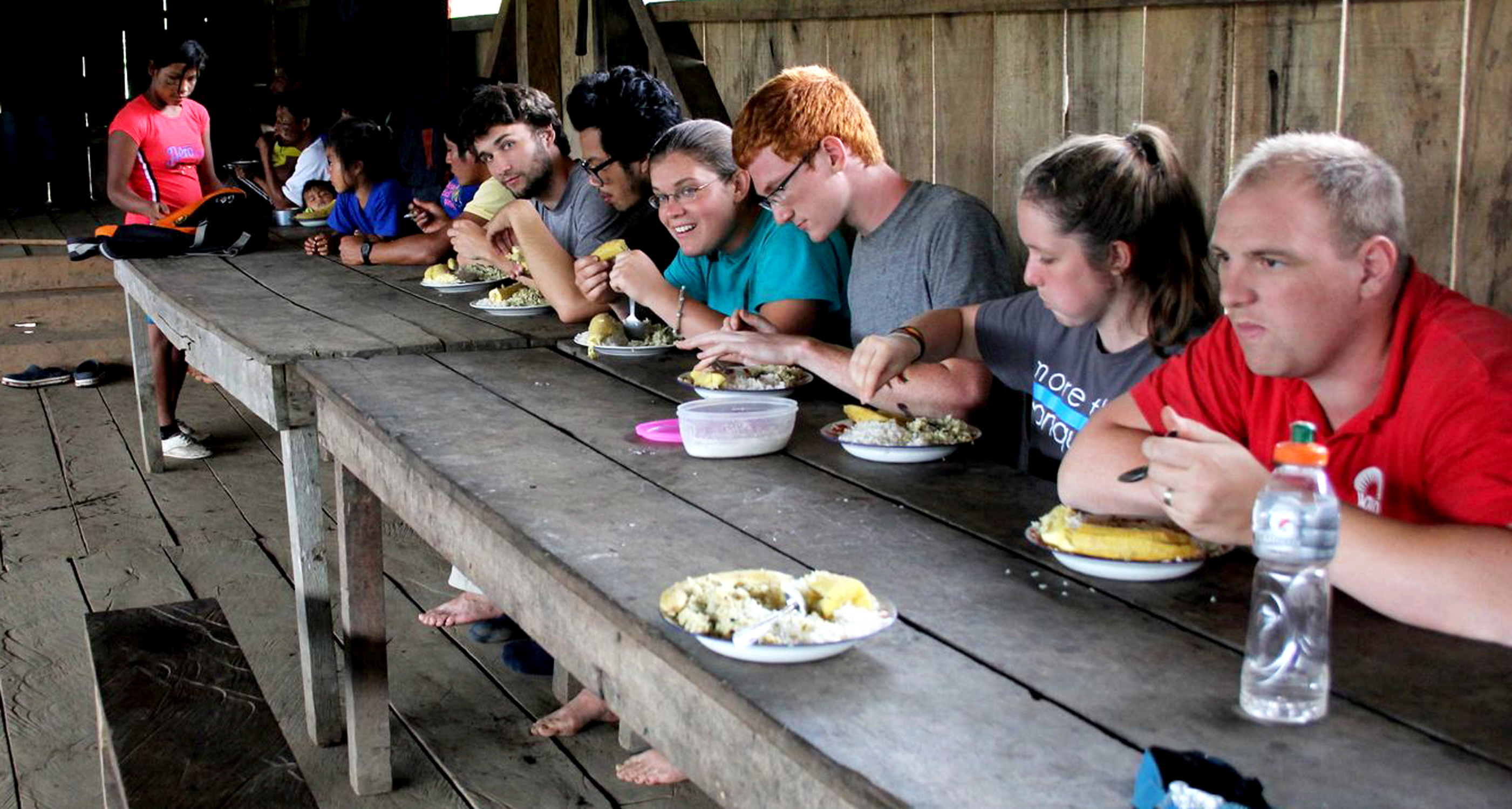 A simple meal in these surroundings represented hospitality extended and warm fellowship. Laura, the wife of a leader in the jungle community of Santa Rosa, opened up her home to a gringa by showing hospitality and welcoming her to be a part of Ecuadorian life.
A simple meal in these surroundings represented hospitality extended and warm fellowship. Laura, the wife of a leader in the jungle community of Santa Rosa, opened up her home to a gringa by showing hospitality and welcoming her to be a part of Ecuadorian life.
Well, I am that gringa. This summer I had incredible opportunities, all made possible through my internship with Reach Beyond. For eight days I worked in Santa Rosa, helping build a system to bring clean water to individual houses.
Engineering tasks such as digging trenches, preparing a water tank and tower, and putting in solar panels to power the system were all opportunities to build relationships with the people. Specifically, I had an opportunity to build relationships with the area women.
The first day I sat with Fanny, daughter of the community leader, Pedro. As she demonstrated how to make a popping noise in the leaf of a yuca plant, I discovered that leaf popping was by no means my talent.
Our second day in Santa Rosa we headed off to work on the same task we had done the day before, helping with a clean water project. At one point it started to rain—a common occurrence in the Ecuadorian jungle. I struck up a conversation with three sisters, Gladys, Loida and Margo. I learned something of their family and enjoyed simply spending time with them.
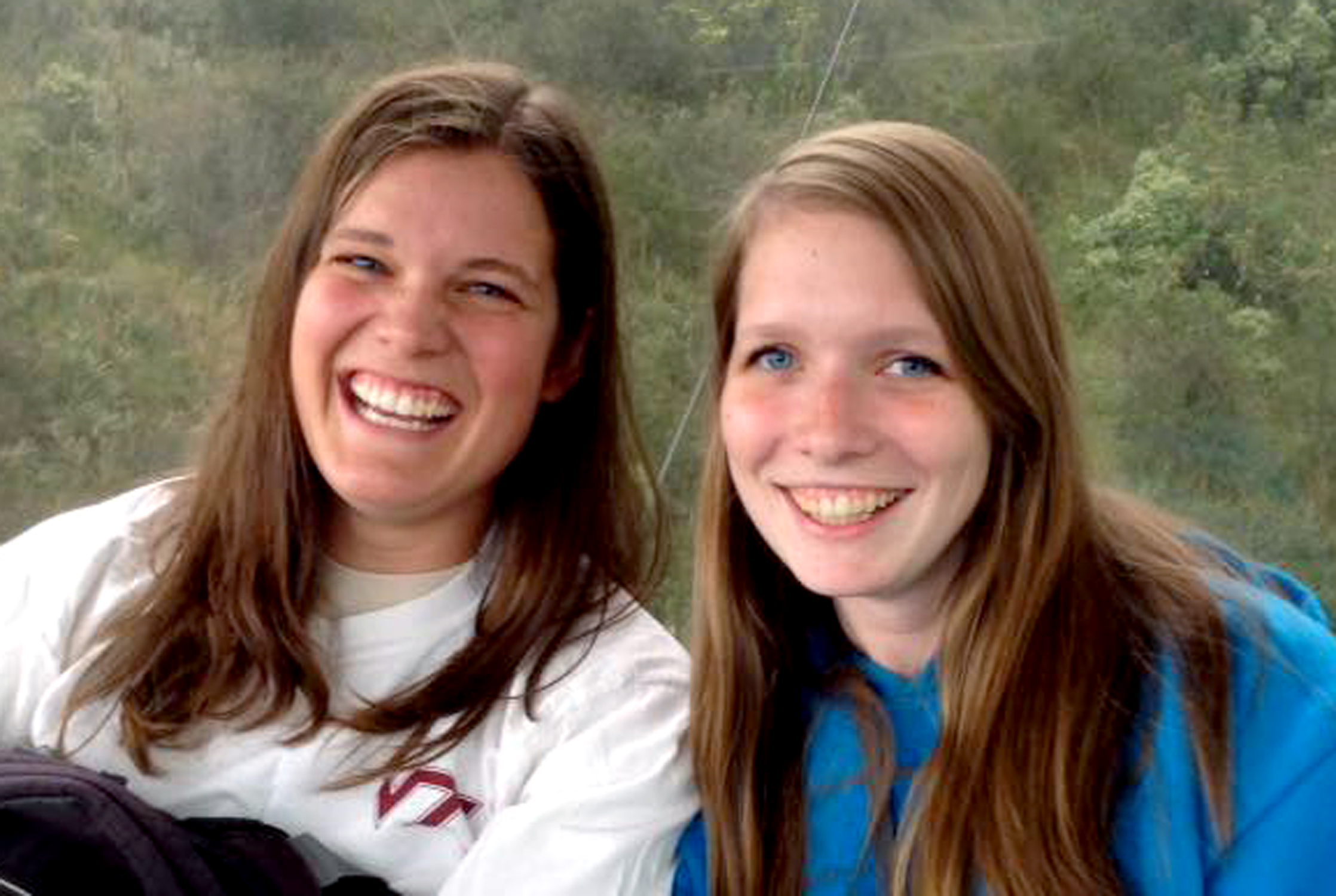 After the rain stopped we moved on to another area to work. While there, Gladys showed me how to carry a heavy basket with a head strap and then allowed me to use her machete as she taught me how to cut papachinas (a type of potato) from the ground.
After the rain stopped we moved on to another area to work. While there, Gladys showed me how to carry a heavy basket with a head strap and then allowed me to use her machete as she taught me how to cut papachinas (a type of potato) from the ground.
With much laughter, Gladys showed me the steps associated with serving chicha (a fermented beverage made with yuca which is a staple in the jungle) and demonstrated how to plant papachinas and yuca.
She invited Jacque (the other female intern with Reach Beyond) and me to go on a walk after lunch. Although we didn’t know where the walk would go or what Gladys meant by “far,” we readily accepted. After lunch we put on my sunscreen, drank some water and headed off to meet Gladys.
Jacque and I followed her footsteps to a nearby farm where—as she recounted to us—lived a man who has two wives. As the three of us sat in the cool shade, we were presented with an opportunity to talk to Gladys about Christianity. She had questions about what it means to do what the Bible says.
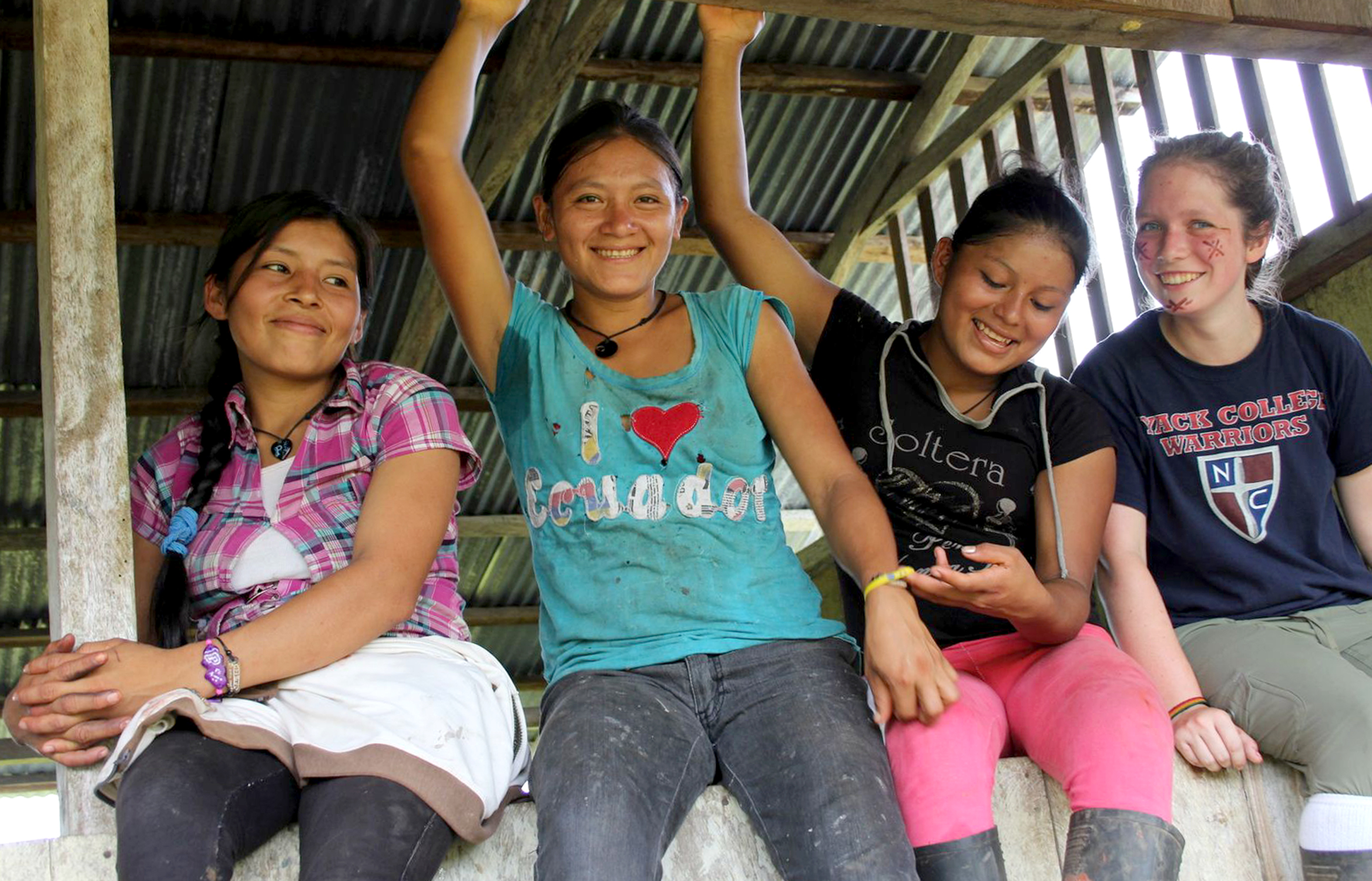 In the best Spanish I could muster, I said that in my relationship with Christ actions are a response to His love, not a means of attaining my own salvation. Due to barriers, I’m not sure Gladys understood but I’m very grateful for the opportunity to talk together.
In the best Spanish I could muster, I said that in my relationship with Christ actions are a response to His love, not a means of attaining my own salvation. Due to barriers, I’m not sure Gladys understood but I’m very grateful for the opportunity to talk together.
We were greeted by a lady who offered us a pineapple to share. We sat and talked more. This time together provided Jacque and me with our first experience at seeing how important it is for the women simply to spend time with each other.
As the week progressed I was presented with more opportunities to experience life with the women. One highlight was going fishing with Fanny and Loida. Fishing in the jungle is different from fishing in New York, my home state. Together, we chewed on yuca which Fanny then mixed with a powdered poison. She then threw the yuca mixture into the river.
After five minutes passed, fish floated to the water’s surface as the poison took effect Fanny, Loida and I gathered the fish, all ranging from one to three inches in length. Showing patience, they showed me how to remove the throat and stomach, and after my first 20 or so fish, I could remove these parts without their help.
Hours passed. We spent time walking from river to river, preparing more fish poison, and just sitting with each other. Once again I learned that while the task was being accomplished, one of the most important aspects of life was simply being together. After we had enough fish, the three of us headed back to Fanny’s house to prepare food.
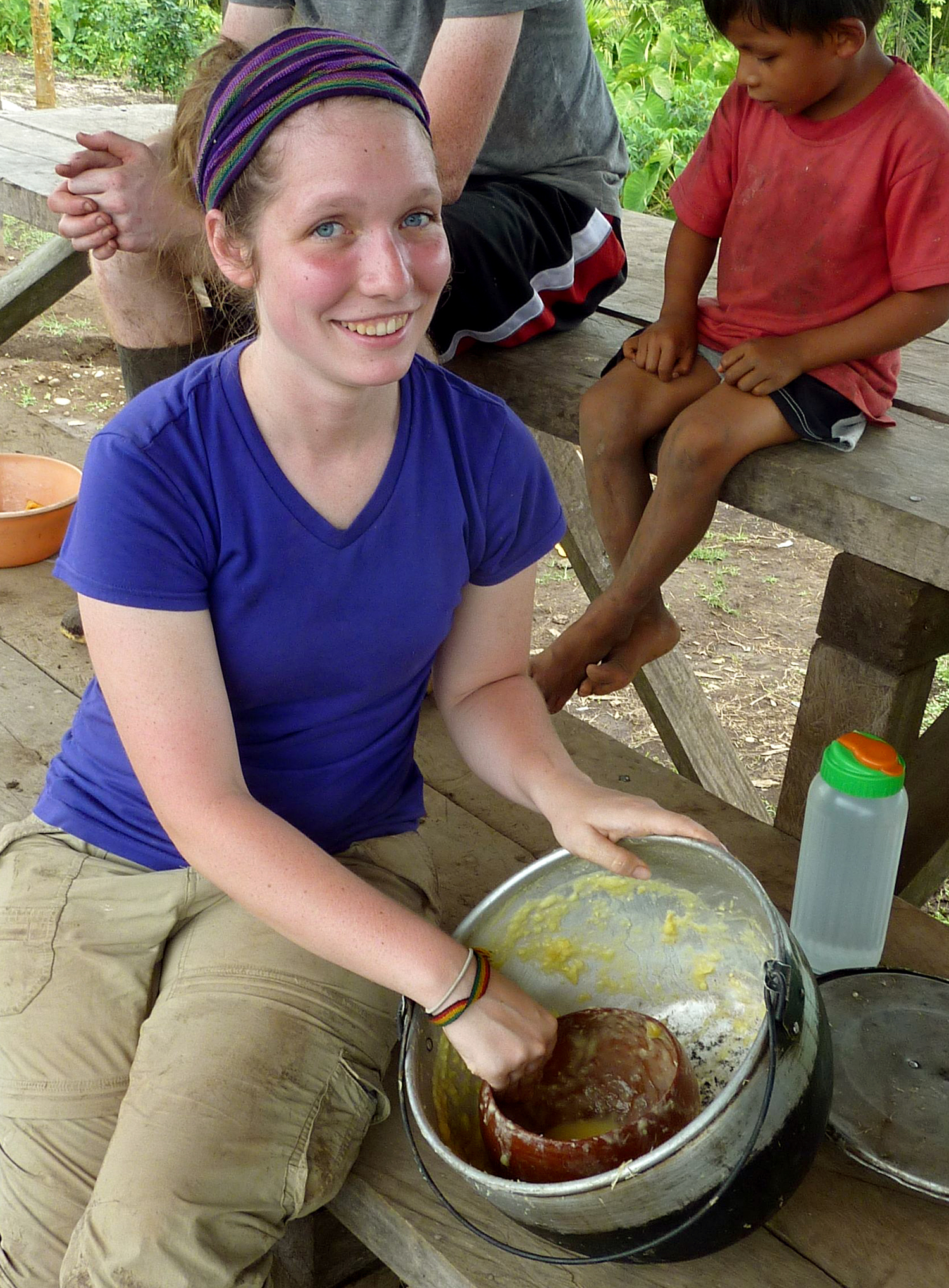 It was time for merienda (dinner). Fanny, Loida and I served the community and others from Reach Beyond the fish we had spent hours preparing. The main course was accompanied by salted yuca and papachinas. Serving brought me great joy as I saw the community’s appreciation.
It was time for merienda (dinner). Fanny, Loida and I served the community and others from Reach Beyond the fish we had spent hours preparing. The main course was accompanied by salted yuca and papachinas. Serving brought me great joy as I saw the community’s appreciation.
The day I served dinner was a Saturday; I was in Santa Rosa until the following Wednesday. Countless opportunities arose for learning about the culture of a Shuar woman. To name a few I learned a Shuar dance, ate multiple meals with families and carried a bucket of chicha through the jungle. In all of these experiences, I began to learn about the beautiful, supportive, submissive role displayed by the women.
Being in Santa Rosa to help with the water project enabled me to experience life alongside the women in Santa Rosa. Although I was only in the community for eight days, the relationships I began to form with women enabled me to partake in their way of life. Their willingness to share opened my eyes to the beauty of life within the Ecuadorian jungle.
*Surname omitted for security reasons
Source: Reach Beyond
“When I first entered Ecuador, I had no practice in the medical field,” said Connor Johnson, a medical intern from the University of Northwestern-St. Paul. “I simply had no experience with what it looked like to apply what I had been learning by ministering to people who need medical attention, especially in a Third World country.”
 “I came into this internship not knowing anything about how engineering looks on the mission field,” added intern Tim Wolfe, a student studying mechanical engineering at Grove City College.
“I came into this internship not knowing anything about how engineering looks on the mission field,” added intern Tim Wolfe, a student studying mechanical engineering at Grove City College.As the internship progressed, interns stepped out of their comfort zones to do unfamiliar things, including learning how to weld, constructing a 20-foot-high water tower and integrating into the Ecuadorian culture. Countless opportunities arose and the interns seized them.
“I learned to respect the roles in the jungle for men and women and to recognize when to hop in and work and when to hold back,” said Jacque Zook, an engineering intern from Virginia Tech.
“I definitely saw many variations of Ecuadorian culture and subcultures within Ecuador. It was nice to work in the busy city of Quito, in a rural clinic and with the indigenous people,” stated Johnson who was presented with the opportunities to shadow doctors, and teach hygiene in the Ecuadorian jungle.
The numerous learning opportunities and experiences enabled the interns to learn about themselves and the missionary lifestyle. They also learned that serving God is not always glamorous.
“Missionary life is not what I thought it was,” commented Johnson. “It’s not just standing on the corner and preaching to everyone—it’s incorporating Christ into your work, your relationships and every aspect of your life.”
“I was able to read books like When Helping Hurts and experience how you can meet people’s physical needs and share the gospel at the same time,” added intern *John, studying civil engineering at Wheaton College.
 Some of the interns said they also learned more about themselves while serving in the remote jungle community of Santa Rosa where they visited four different times and built relationships. Projects ranged from helping construct a water tower to digging trenches and simply spending time with community members.
Some of the interns said they also learned more about themselves while serving in the remote jungle community of Santa Rosa where they visited four different times and built relationships. Projects ranged from helping construct a water tower to digging trenches and simply spending time with community members.“I had a chance to travel with Gladys, one of the Shuar women, to a local farm and talk a little about Christianity with her,” commented Zook.
Serving multiple times in one community enabled interns to see community development firsthand and to understand how to be the “hands of Christ.” In addition to working to bring clean water, the interns also had opportunities to share their faith through giving their testimonies, teaching parables and praying within the community.
“This internship with Reach Beyond has shown me how I can interact and immerse myself in community and culture in a meaningful way while also being able to do engineering mission work for the glory of God,” said intern Jerome Navarro, a civil and environmental engineering student at Calvin College.
“I’ve begun to learn how to do missions with a specific skill set,” added John.
The interns learned that serving is not about what you know, but what you are willing to do, even when you do not know. The internship provided opportunities that have shaped interns into servants and has created lessons they cannot easily forget.
Rachel Kunker, majoring in intercultural studies at Nyack College in New York, was one of six students in Reach Beyond’s Ecuador summer internship this year. This involved helping with community development activities at different locations for 10 weeks.
Bridging Cultural Differences, Building Community with Water System Installation
The chainsaw roared from around 6 a.m., echoing through the nearby jungle around Santa Rosa, Ecuador, where people were getting wood ready to construct a water tower.
 This was just one of the many steps in bringing clean water to the settlement. Excitement pulsed as the people learned and enacted what it means to take ownership of their water project. Hands were ready and hearts were open.
This was just one of the many steps in bringing clean water to the settlement. Excitement pulsed as the people learned and enacted what it means to take ownership of their water project. Hands were ready and hearts were open.Approximately eight months earlier, Santa Rosa, a small community a half hour’s flight from Shell, received government approval to have a water system. Reach Beyond missionaries and summer interns have worked alongside the people in the system’s installation.
For the summer interns, the first trip to Santa Rosa was “just to give us interns a feel for the community and a picture of what we’d be working with,” according to intern Jacque Zook, majoring in environmental engineering at Virginia Tech. Although this was just an overnight visit, enthusiasm among the local residents was evident. All of the requested trenches had already been dug—no small task.
Through careful observation, Reach Beyond’s Wim de Groen was able to notice positive aspects of community development: respect was earned by leaders and it was given to them. Additionally, people showed attitudes of stepping up to take ownership of the project.
“They are always initiating for the next step and come up with new ideas for the system to work better in the future,” stated an intern named John, a civil engineering student at Wheaton College. By the second trip, it was clear that the people of Santa Rosa were taking complete ownership of their project.
When pipes were brought, people almost instantaneously placed them into the corresponding trenches. “The people in Santa Rosa really want their system,” said Martijn Bredius of Reach Beyond. “As water project leaders, we don’t have to drive the project. We are following them. They have a desire and are working hard to reach the end result.”
 Team leader Wim de Groen reminded the interns to focus not only on the water system, but on community development in an effort to spread the gospel by forming relationships. By the third trip to Santa Rosa, those deepening relationships were clearly evident.
Team leader Wim de Groen reminded the interns to focus not only on the water system, but on community development in an effort to spread the gospel by forming relationships. By the third trip to Santa Rosa, those deepening relationships were clearly evident.“I talked with Marco, one of the community members who has been a Christian for two years and is rapidly growing in his faith,” said Zook. “He shared his testimony with me, and then I later explained one of my favorite stories in the Old Testament to him.” The interns also learned Shuar dances, went fishing with community members, shared a drink known as chicha and played fútbol (soccer) among countless other activities.
“It’s amazing to see how much more there is to learn about other cultures and the exchanges that we have and what that reveals in our own lives and what we hold as truly important,” remarked intern Jerome Navarro, a civil and environmental engineering student at Calvin College.
In addition to constructing the 20-foot-high water tower, the people of Santa Rosa dug trenches, fixed an old tank and helped place wiring underground for an anticipated solar panel.
“It’s been a privilege to work with a community that has taken so much ownership over the project,” commented John.
“The more time we spend with the people of Santa Rosa, the more opportunities we find to share our faith through songs and Scripture,” said intern Tim Wolfe, a mechanical engineering student at Grove City College. “I enjoy connecting with the people through singing because music is a universal language that everyone can understand.”
At a Santa Rosa church service, the locals and their visitors sang in English, Spanish and Shuar with a message by a community member on what it means to follow Christ.
“Meeting physical needs in Santa Rosa has provided some great opportunities to discuss and address spiritual needs as well,” said Wolfe. “I had a chance to travel with Gladys, one of the jungle women, to a local farm and talk a little about Christianity,” remarked Zook.
After a couple of months work in Santa Rosa, De Groen and others from Reach Beyond were excited to see the community’s openness to the gospel.
Building Relationships with Women in the Ecuadorian Community of Santa Rosa
Laughter fills the area between the thin wood walls and palm roof. Food is shared, a modest meal of sardines, yuca (cassava) and naranjitos (little oranges).
 A simple meal in these surroundings represented hospitality extended and warm fellowship. Laura, the wife of a leader in the jungle community of Santa Rosa, opened up her home to a gringa by showing hospitality and welcoming her to be a part of Ecuadorian life.
A simple meal in these surroundings represented hospitality extended and warm fellowship. Laura, the wife of a leader in the jungle community of Santa Rosa, opened up her home to a gringa by showing hospitality and welcoming her to be a part of Ecuadorian life.Well, I am that gringa. This summer I had incredible opportunities, all made possible through my internship with Reach Beyond. For eight days I worked in Santa Rosa, helping build a system to bring clean water to individual houses.
Engineering tasks such as digging trenches, preparing a water tank and tower, and putting in solar panels to power the system were all opportunities to build relationships with the people. Specifically, I had an opportunity to build relationships with the area women.
The first day I sat with Fanny, daughter of the community leader, Pedro. As she demonstrated how to make a popping noise in the leaf of a yuca plant, I discovered that leaf popping was by no means my talent.
Our second day in Santa Rosa we headed off to work on the same task we had done the day before, helping with a clean water project. At one point it started to rain—a common occurrence in the Ecuadorian jungle. I struck up a conversation with three sisters, Gladys, Loida and Margo. I learned something of their family and enjoyed simply spending time with them.
 After the rain stopped we moved on to another area to work. While there, Gladys showed me how to carry a heavy basket with a head strap and then allowed me to use her machete as she taught me how to cut papachinas (a type of potato) from the ground.
After the rain stopped we moved on to another area to work. While there, Gladys showed me how to carry a heavy basket with a head strap and then allowed me to use her machete as she taught me how to cut papachinas (a type of potato) from the ground.With much laughter, Gladys showed me the steps associated with serving chicha (a fermented beverage made with yuca which is a staple in the jungle) and demonstrated how to plant papachinas and yuca.
She invited Jacque (the other female intern with Reach Beyond) and me to go on a walk after lunch. Although we didn’t know where the walk would go or what Gladys meant by “far,” we readily accepted. After lunch we put on my sunscreen, drank some water and headed off to meet Gladys.
Jacque and I followed her footsteps to a nearby farm where—as she recounted to us—lived a man who has two wives. As the three of us sat in the cool shade, we were presented with an opportunity to talk to Gladys about Christianity. She had questions about what it means to do what the Bible says.
 In the best Spanish I could muster, I said that in my relationship with Christ actions are a response to His love, not a means of attaining my own salvation. Due to barriers, I’m not sure Gladys understood but I’m very grateful for the opportunity to talk together.
In the best Spanish I could muster, I said that in my relationship with Christ actions are a response to His love, not a means of attaining my own salvation. Due to barriers, I’m not sure Gladys understood but I’m very grateful for the opportunity to talk together.We were greeted by a lady who offered us a pineapple to share. We sat and talked more. This time together provided Jacque and me with our first experience at seeing how important it is for the women simply to spend time with each other.
As the week progressed I was presented with more opportunities to experience life with the women. One highlight was going fishing with Fanny and Loida. Fishing in the jungle is different from fishing in New York, my home state. Together, we chewed on yuca which Fanny then mixed with a powdered poison. She then threw the yuca mixture into the river.
After five minutes passed, fish floated to the water’s surface as the poison took effect Fanny, Loida and I gathered the fish, all ranging from one to three inches in length. Showing patience, they showed me how to remove the throat and stomach, and after my first 20 or so fish, I could remove these parts without their help.
Hours passed. We spent time walking from river to river, preparing more fish poison, and just sitting with each other. Once again I learned that while the task was being accomplished, one of the most important aspects of life was simply being together. After we had enough fish, the three of us headed back to Fanny’s house to prepare food.
 It was time for merienda (dinner). Fanny, Loida and I served the community and others from Reach Beyond the fish we had spent hours preparing. The main course was accompanied by salted yuca and papachinas. Serving brought me great joy as I saw the community’s appreciation.
It was time for merienda (dinner). Fanny, Loida and I served the community and others from Reach Beyond the fish we had spent hours preparing. The main course was accompanied by salted yuca and papachinas. Serving brought me great joy as I saw the community’s appreciation.The day I served dinner was a Saturday; I was in Santa Rosa until the following Wednesday. Countless opportunities arose for learning about the culture of a Shuar woman. To name a few I learned a Shuar dance, ate multiple meals with families and carried a bucket of chicha through the jungle. In all of these experiences, I began to learn about the beautiful, supportive, submissive role displayed by the women.
Being in Santa Rosa to help with the water project enabled me to experience life alongside the women in Santa Rosa. Although I was only in the community for eight days, the relationships I began to form with women enabled me to partake in their way of life. Their willingness to share opened my eyes to the beauty of life within the Ecuadorian jungle.
*Surname omitted for security reasons
Source: Reach Beyond
